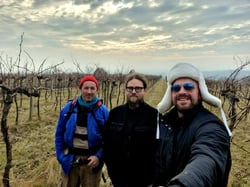
22 9 10194 KM
Harvest is strictly manual. I own cca 3,5 ha of productive vineyards (the full size of our land is cca 10ha), mostly small and old plots I either inherited from the family or bought as neglected. In addition to that, part of our grapes come from my neighbour and winegrower who also takes care of our own vineyards, ie. all our fruit is treated with the same care and philosophy. (The proportion varies depending on vintage but its around 3 extra ha on average.) The vines are trained in the locally traditional high cordon or guyot, part is completely unpruned for acidity. We work with locally typical Pesecká Leánka (Feteasca Regala, maiden grape) and its "mother" Feteasca Alba, Pinot Gris and Blaufrankisch; a few rows I inherited are planted with Devín, aromatic Slovak cross from the 1950s.
The vineyards are located in Čajkov and Rybník villages at the foot of Štiavnica Mountains, on volcanic soils rich with tuff & basalt coming from the extinct crater of the ancient Sitno Volcano. Although continental, the climate can still be considered cool, with big differences between summer and winter and day and night, preserving freshness and aromatics even in the current climate change challenge.
Cellar Philosophy
Spontaneous fermentation only, most white wines undergo skin contact of various length depending on vintage and variety. Strong focus on sparkling wines (secondary fermentation, aging on lees). The wines (except for Princess) age in old barrels in our unique wine cellar built in the 17th century, 50m underground. It has a stable temperature (cca 10°C) all year round, perfect humidity, so the wines age undisturbed, some for more than 3 years, with very little evaporation. No racking. Some cuvées and vintages naturally develop flor. No filter, no fining of course, tiny bit of SO2 at bottling – 5-25 ppm depending on the wine and vintage.
I feel very proud that despite all the tumults of Central-European history, my family has been strongly linked with the village of Čajkov and its wine industry since generations – our bottles display the seal that the Archbishop of Esztergom gave to my family in 1666, entitling us to trade with wine and agricultural produce.
No white wines at the moment.
FIND THE EVENT YOU ATTEND